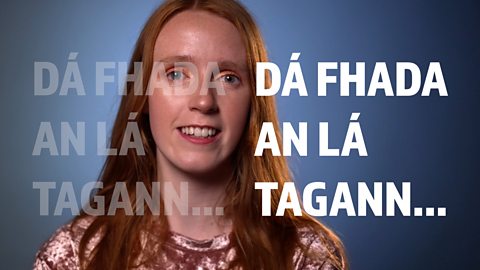Dá Fhada an Lá Tagann an Tráthnóna

Dá Fhada an Lá Tagann an Tráthnóna
However Long the Day, Night Will Come.
Nótaí d'Fhoghlaimeoirí
If you have a ‘cúpla focal’;
Dá fhada an lá tagann an tráthnóna
However long the day, the evening comes.
This proverb expresses displeasure at the length of the day and an expectation that things will improve in the evening.
If we examine the sentence we will see that there are acute accents over some of the vowels. An accent like this is called a ‘síneadh fada’. It simply means that the vowel is lengthened, this happens in ‘lá’, however, ‘dá’ is an unstressed part of the sentence and therefore despite the ‘síneadh fada’ the ‘a’ is not pronounced long in this instance. In the word ‘tráthnóna’, the ‘a’ is not lengthened in speech because the stress is on the second part of the word.
Aspiration occurs in the word ‘fhada’ which means the ‘f’ is silent.
The two nouns ‘lá’(day) and ‘tráthnóna’ (evening) are preceded by the definite article ‘an’ (the).
The verb ‘tagann’ is the present tense third person of the verb ‘tar’ (come).
If you’re an advanced learner;
Dá fhada an lá tagann an tráthnóna
However long the day, the evening comes.
This proverb begins with the phrase ‘dá fhada’ (no matter how long). In this structure ‘dá’ aspirates the initial consonant of a following abstract noun:
Dá fheabhas Síle is fearr Seán (No matter how good Sile is Seán is better). The abstract noun in this case is ‘feabhas’ (excellence).
In the proverb we are examining here one would expect an abstract noun and not an adjective. Therefore in our proverb we would have:
‘Dá fhad ... – ‘fad’ (length) being the abstract noun instead of ‘fada’ (long) which is an adjective.
The verb here is ‘tagann’’ the present tense of the irregular verb tar’ (come).
‘Fada’ here expresses a longing or a desire for something unpleasant to end and is found in a a sentence such as:
‘Is fada liom an oíche gheimhridh’(I find the winter night(s) long)
If you’re fluent but would like to improve your grammar;
Dá fhada an lá tagann an tráthnóna.
Is cuma cé chomh fada is atá an lá beidh an tráthnóna ann ina dhiaidh.
Ciallaionn an seanfhocal seo go dtiocfaidh deireadh le stró nó le buaireamh agus go mbeidh faoiseamh agus pléisiúr ann sa deireadh.
I dtús na habairte tá an frása ‘dá fhada’, frása a dtugaimid an t-ainm teibí céime air, ina bhfuil ‘dá’ agus ina dhiaidh sin ainmfhocal teibí a bhfuil séimhiú ar a thúschonsan. Amharc ar an tsampla a leanas:
‘Dá olcas (ainmfhocal teibí ón aidiacht ‘olc’) Pól is measa Peadar’ i.e. is cuma cé chomh holc is atá Pól tá Peadar níos measa.
Bheifeá ag dúil sa tseanfhocal s’againn leis seo:
‘Dá fhad (‘fad’ an t-ainm teibí in áit ‘fada’ an aidiacht) an lá tagann an tráthnóna.’
Is é ‘tagann’ an aimsir láithreach tríú pearsa den bhriathar neamhrialta ‘tar’.